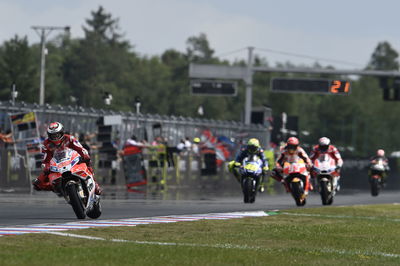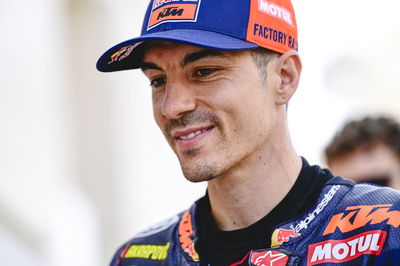‘I’d like to keep riding for Aprilia until I retire”
Aleix Espargaro doesn’t leave you second-guessing. Across a 35 minute interview he offers opinions on issues ranging from the length of the current racing calendar to the might of Piaggio, parent company of Aprilia. And there’s more than one take on his 2018 experience to date. “A disaster” he says of the first eight races. Another time he labels it “horrible”. It can’t be easy for the 28-year old, who reveals he doesn’t take such things lightly. “I feel very bad after one bad result,” he says. “Very bad. It’s something that consumes the inside of me.”
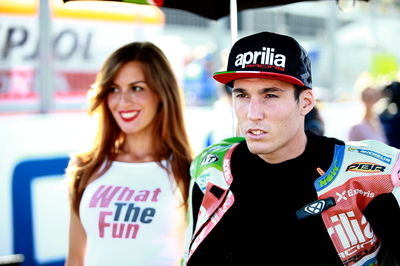
Aleix Espargaro doesn’t leave you second-guessing. Across a 35 minute interview he offers opinions on issues ranging from the length of the current racing calendar to the might of Piaggio, parent company of Aprilia. And there’s more than one take on his 2018 experience to date. “A disaster” he says of the first eight races. Another time he labels it “horrible”. It can’t be easy for the 28-year old, who reveals he doesn’t take such things lightly. “I feel very bad after one bad result,” he says. “Very bad. It’s something that consumes the inside of me.”
If we’re to take his word, the brief two-week summer break came at just the right time, offering a brief chance to relax, reflect and recharge. There’s no dressing it up: the season’s first half has been a struggle for Aprilia. And this was Aleix in conversation with Crash.net in the Netherlands, before a warm-up crash bruised his ribs and put him out of the German Grand Prix.
It doesn’t take a stretch of the imagination to identify the source of Espargaro’s frustration. 2018, his second year with the Italian marque, was supposed to be an upturn on last season, when several outstanding results (sixth in Qatar, seventh at Aragon) were contrasted by repeated mechanical failures. But as it stands he sits 18th in the championship with just 16 points to his name.
In Espargaro’s hands the ’18 RS-GP remains an upgrade on last year’s model. Yet Suzuki’s vast improvement coupled with the consistency of Yamaha, Honda and Ducati’s satellite contingent has resulted in that illusive top six appearing further away than before. Those technical gremlins haven’t disappeared either, with outings in Qatar, Argentina, Jerez and Barcelona beset by mechanicals that resulted in Espargaro appearing listless and deflated in the hours that followed. What had already been a challenging few months couldn’t have been helped by news that crew chief Marcus Eschenbacher will switch Aprilia for KTM at the end of the year.
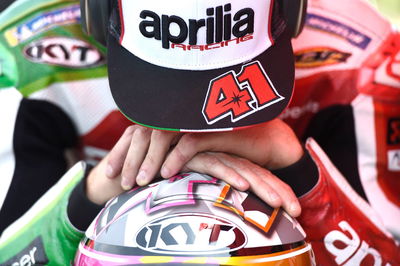
“The results have been a disaster,” says Espargaro. “The first part of the season has been a real disaster, especially in three of seven races the bike stopped. I crashed in just one race … I need the results. It’s like my fuel. I need this. It’s what makes me get up early to train every morning.”
And yet, for all that, Espargaro is upbeat and positive. At the beginning of June, wife Laura Montero gave birth to twins Max and Mia. With that came a change in perspective. “My priorities changed a lot,” he admits. “A lot. It’s unbelievable how much [it] changes in just three weeks because of these two pieces that can’t even talk or see me. It also gives you a really positive energy.”
The racing front isn’t all doom-and-gloom, either. The promise of Aprilia piecing together a new test team for 2019 bodes well. As does the signing of MotoGP race winner Andrea Iannone, a move that may result in greater tension within those garage walls, but should offer greater direction going forward.
There remains the sense that Espargaro is entirely wedded to this project, too. Soon after Iannone’s signing, Espargaro detailed how he had urged Romano Albesiano, Aprilia’s technical chief, to sign the unpredictable yet precocious Italian. He has been pushing the same man to expand Aprilia’s test team. And through all the toil and recent frustration, the Catalan who hails from Granollers – 1km from the Circuit of Catalunya – sees the rest of his premier class future riding for the Noale factory.
“If I am more competitive, I’ll keep riding four more seasons,” he says. “What I’d really like is to retire with Aprilia. I wouldn’t like to ride somewhere else. I would like to finish my career with the same brand, trying to improve the bike, trying to make history with this brand. This makes me very happy, because Aprilia is a really good brand but in MotoGP it hasn’t had many experiences, many stories, many good results. I would like to keep riding and making history for Aprilia until the moment I retire.”
Viewing his entire career, this comes as little surprise. Until 2015, Espargaro’s CV had been something of a mixed bag. Or “a rollercoaster, a disaster” as he calls it. Rather than following the conventional path of two-three years in the junior categories before graduating to the next level, the Catalan moved to 250s after just 23 grand prix in the 125 class. He made his MotoGP debut a month after his 20th birthday and after a brief foray in Moto2, he had successful spells with Jorge Martinez Aspar’s CRT project, Forward Racing’s ‘Open’ Yamaha and Suzuki’s return to MotoGP. Little wonder he craves stability.
“Obviously it’s been very bad because I was in 125s for a year and a half and then I jumped to 250s super young,” says Espargaro. “I tried MotoGP with just 17 years old and then I went back to Moto2. [Then] MotoGP… Everything was not helping me to explode as a rider. What you need as a kid is a little bit of continuity. But the only positive thing I gained was I had to be very fast to adapt to the [different] bikes. Maybe from this I became more sensitive.”
Unlike all-but-two of his MotoGP contemporaries, Espargaro has never won a grand prix. But his ability to aid the development of Suzuki’s GSX-RR into a regular podium scoring package convinced Aprilia that, in his hands, the RS-GP could make a considerable jump toward the Hondas, Yamahas and Ducatis that have become the benchmark of the premier class. The struggles of recent team-mates (and Moto2 race winners) Sam Lowes and Scott Redding have only further underlined his talent.
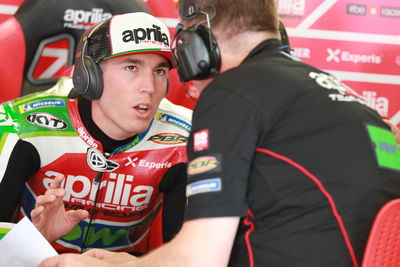
But Espargaro admits he is “a nervous guy.” He talks at speed and repeatedly mentions the stresses of being a factory rider: “A lot of people depend on our results. In Italy. In Noale. Here at the track. My family. My manager. The guys that work with me. The guy who drives my motorhome. My physical trainer. You pay a lot of people around you. This gives you a lot of pressure at home, a lot of pressure.” This was recently apparent, too. A crash out of the leading group in last year’s Australian Grand Prix was in part due to an inability to ride and think freely, the proximity of the class’ leading lights almost a weight on those slim shoulders.
“I’m still emotional. I’m still a really emotional guy,” Espargaro admits. “[But] I’m working with my coach to have better control in the situations. This doesn’t mean that I have to lose my energy, to change my character. He always says the same: ‘You are like this. You are a nervous guy and like this. We don’t need to change this.
“But what we tried is he gave me some tools to control situations better, to be more prepared for a situation, to be more prepared for a failure, to be more prepared if some days the bike stops, or if I’m not competitive. To try and carry the situation with more ‘relax’. Obviously this season, for example, the three times the bike stopped were very, very difficult. I talked with him a lot. It helped me quite a lot, but obviously at 28 it’s not easy to change the character.”
An alleviation of that stress may also come from internal reorganisation in Aprilia’s factory team. Albesiano recently spoke of the need for his riders and technicians to work with greater calm, thinking only of the appointment with the grid at 14:00 on Sunday afternoon. Espargaro agrees, stating both he and Eschenbacher can work harder on this aspect.
“I think the organisation, we can improve a lot. In the garage we have to be more calm and have better organisation. I think with the crew chief I have – he’s a very, very intelligent guy but on the organisation side I have to improve myself and also him. So for next season I’m sure it will be much better. Obviously, this season when you feel good on the bike and you are close to the top six and the bike stops three times…” - here he exhales deeply for added effect - “it’s not easy to be calm at the next round. At the next round it happens again. You try to be calm and it happens again. So it’s very difficult for me to be calm and not have pressure.”
Click Below for Page 2...
